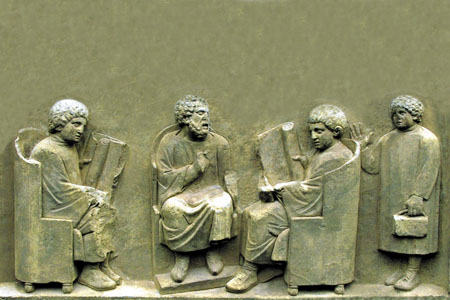
Master stone cutters of Nubia and Ethiopia, master stone masons of Egypt
and Libya, master builders of Anatolia, Cretes, Cyprus, Malta and southern
Greece, all black, all children of Africa, were the real builders of the cities
of the Roman Empire. It was almost comparable to how black people built the
Americas, just that in Roman, those builders were celebrated nobility, whereas
in the case of Americas, there were degraded as slaves. (Which is why it is
generally said that ancient Romans invented nothing new and simply built on the
foundations of more sophisticated but more ancient civilizations).
The point cannot be overemphasized. The Africans were foundational to
the building and the expansion and the success of Rome. Thus, at the time of
Septimius Severus, the African Muurs had gotten so influential and so numerous
in the Empire that it was only a matter of time before they would take over the
reigns of command.
The African called Laetus: Wars and Conspiracy
In those days, there were lots of discontentment with the politics of
the day, both amongst the commoners and the elites. Rome was being ruled by a
carry over from the days of Emperor Marcus Aurelius, Emperor Commodus, who was
hated by everyone including those entrusted to protect him.
In the military, African muurs had become so strategically important
that they even had a circle which determined the overarching contours of the
empire’s military politics. It was a shadow government of sorts that ruled Rome
from behind the curtains. This secret group of Muurish politicians and military
officers were sick and tired of Emperor Commodus and had resolved to get rid of
him one way or the other.
Right at the heart of the midst of the plot to kill Emperor Commodus,
was an African friend of Severus’ called Laetus. He was the then current grand
master of the secret cabal that ruled Rome. Laetus was the Praetorian Prefect.
The praetorian prefect was the head of the palace guards that protected the
person of the Emperor. The palace guard was a legion of elite soldiers, trained
to the highest standard who maintained the security of the Imperial circle.
Thus next to the Emperor himself, the office of the praetorian prefect was the
most powerful pedestal for affecting events in the empire.
In those treacherous days, when plots swirled in dark alleys of Rome,
and the dogs hung in the shadows waiting for the moment the prey lost its
wariness, and every walls had ears, Prefect Laetus could not afford to be
caught with his guards down. Many had been so caught and had paid the ultimate
price. So, Laetus placed people he could rely on in key positions of the
empire. And so his friend and African brother Septimus Severus was put in place
as governor of Upper Pannonia and the commander of the imperial legion.
Pannonia was a province of the Roman Empire, corresponding to
present-day western Hungary and parts of eastern Austria, as well as portions
of several Balkan states, primarily Slovenia, Croatia, and Serbia (Vojvodina).
The Pannonians were mainly Illyrians, but there were some Celts in the western
part of the province.
The army commanded by Septimius Severus in Pannonia was no odinary one.
For one it was mostly composed of a corp of crack Muurish soldiers recurited in
Mauritania and the Niger bend. They were all dreadlock soldiers. They were
known as the Illyrian legions.

No comments:
Post a Comment